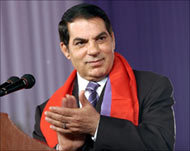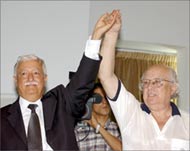Tunisians vote in general election
Tunisians have voted in general elections boycotted by several opposition parties.

Incumbent presidential candidate Zain al-Abidin Bin Ali, however, said the elections on Sunday were a boost to democracy.
Bin Ali, 68, is widely tipped to secure a fourth five-year term. Tunisia’s ruling party, the Constitutional Democratic Rally (RCD), is set to retain control of parliament.
Critics dismissed the polls as a farce to disguise what they say is a police state which beats dissidents, makes arbitrary arrests, and holds a tight grip on the media and political activity.
The Democratic Progressive Party pulled out of the legislative election, citing unfair conditions including censorship of its election manifesto and limited access to voters and the media. Authorities have rejected the charges.
No alternative
A 45-year-old university teacher, who declined to be named, said she voted for presidential candidate Muhammad Ali Haluani, one of three opponents from small parties.
 |
|
Under Bin Ali’s rule economic |
“I want to encourage the opposition to Bin Ali because it’s not fair that he seeks a fourth mandate. He should have opened the way for a democratic alternative,” she said at a polling station in the posh Marsa suburb of the capital Tunis.
Under Bin Ali’s rule the standard of living has increased significantly. Economic growth has averaged 5% in the past decade. More than two-thirds of households own their homes.
Women rights are among the most advanced in the Arab world. “I will vote for the president because I am poor and he always sided with the poor,” said housewife Zuhra Guintasi, 39.
President for life?
Bin Ali, a former army general and interior minister, came to power in 1987 after he arranged for then president-for-life Habib Bourguiba to be declared senile and unfit to rule.
He has won three elections and a constitutional referendum
two years ago to allow him to run again – each time with more than 99% of the vote. All polls were criticised by human-rights groups as a sham.
 |
|
Muhammad Ali Haluani (L) is one |
Opponents accuse him of re-creating a president-for-life rule that Bourguiba, who died in 2000 aged 97, set up.
Diplomats and human-rights activists said a new endorsement with another 99% majority would send the wrong message abroad and undermine arguments by the US administration that it wants to bring more democracy to the Middle East.
Despite concerns over Tunisia’s reform drive, the north African country is an ally of the United States in its “war on terror” and has crushed domestic armed movements.
More rights promised
Bin Ali is promising greater democracy, human rights and individual freedoms, and diplomats and observers say he may ultimately be forced to ease up on the tap.
|
“I will vote for the president because I am poor and he always sided with the poor” Zuhra Guintasi, |
Maintaining economic growth in a country increasingly interlinked with the global economy, satisfying a growing middle-class and finding jobs for restless university graduates
are challenges he will likely face.
“A country competing on the international scene can’t ignore reform. People have access to foreign television channels, see what’s happening abroad, many travel abroad. It will all lead to change at one point,” said human-rights lawyer Radia Nasrawi.
The vote capped a lacklustre electoral campaign that foreign tourists, who descend on Tunisia in millions each year, would not even have noticed.
Polls were expected to close at 4:30pm (1530 GMT) with first results likely to be announced on Monday morning.